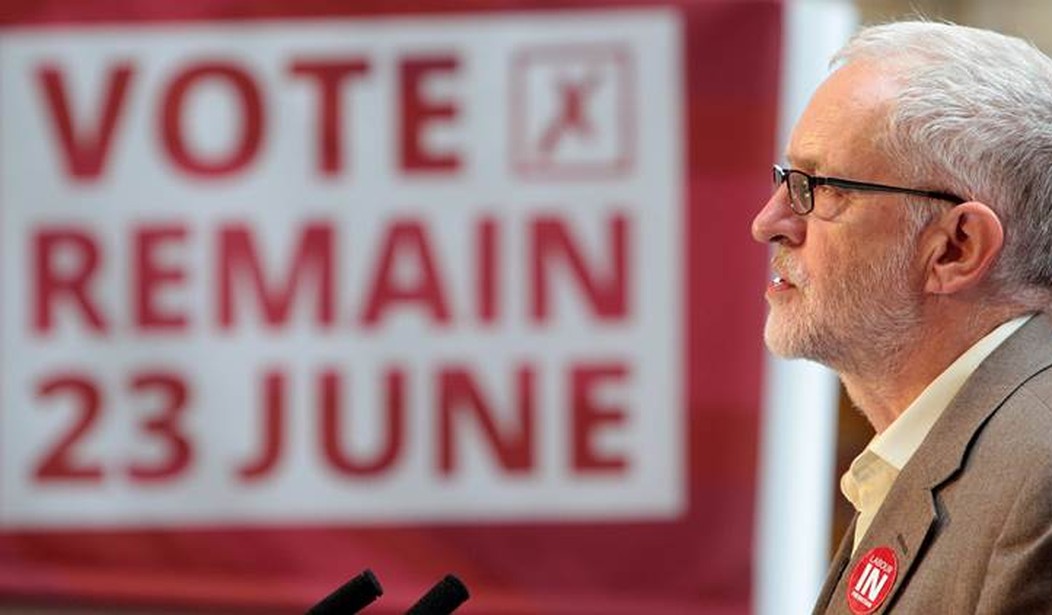British voters have given a glorious poke in the eye to the vast, amorphous, and seemingly all-powerful entity variously described as “the establishment,” the “elites,” and the “political class.” UK politics is in turmoil following the historic vote to leave the European Union.
The Conservative Party is looking for a new leader — and prime minister — to replace David Cameron; the presumed favorite Boris Johnson, the Brexit leader and former London mayor, is already out of the running. The Labour Party is desperately trying to get rid of its own leader. On July 4, Nigel Farage — who as the leader of UKIP changed the face of British politics and almost singlehandedly forced Cameron to hold a referendum on the country’s membership of the EU — stood down. He told party supporters:
I now feel that I have done my bit.
Much has been written in recent years about the growing divisions within Western societies between the rulers and the ruled, and the simmering resentment of ordinary people. Those divisions, and this resentment, have been on display in a number of countries. In Europe, the phenomenon has manifested in the protests against “austerity” being imposed on southern eurozone nations such as Greece and Italy, and the growing popularity of parties of the far-left and far-right. In the U.S., it began with the emergence of the Tea Party, followed by the Occupy movement, and the rise of Donald Trump and Bernie Sanders.
In the UK, it contributed to the rise of Farage’s UKIP amid growing discontent with the European Union. In particular, anger was fueled by the hardships imposed on working-class Britons as a result of mass immigration; this was the result of EU policy regarding free movement of citizens between member countries.
While these disparate movements disagree on much — Occupy and Sanders are mostly preoccupied with class warfare; they see centralized government as the solution rather than the problem — they all share a belief that the system is increasingly rigged against ordinary people.
Britain’s EU referendum was the first true battle of wills between the elites and the people — and the people won. The result has, not surprisingly, unleashed a torrent of fury from the elites directed against the 17 million Britons who had the temerity to defy them, the likes of which has never before been seen in a Western democracy.
The referendum campaign, and the fallout from the result, has also clarified just who the elites are. The deep divisions within British society had long been obscured by left-right political distinctions.
The well-educated vs. the less-educated; young vs. old (furious youngsters claimed to have been ”screwed over” with Brexit by their elders — until it emerged that only around a third of them had bothered to vote).
The provincial towns and shires voted for Brexit, the multi-ethnic metropolitan centers for Remain. Wealthier people tended to favor remain while the less well-off voted for Brexit.
The elites scoff at the notion that there’s any such thing as “the elites” — but they’re real, all right. They comprise most left-wing politicians (just a handful of Labour MPs campaigned for Brexit) and a smaller proportion of ostensibly conservative politicians, epitomized by Cameron. They are banks and multinational companies, academics, NGOs, and much of the media/celebrity set (prominent “Remainers” included actor Benedict Cumberbatch, Harry Potter author JK Rowling, and musician and Live Aid organizer Bob Geldof — who led the abuse of fishermen who sailed up the River Thames in London to protest the EU’s destruction of the UK fishing industry).
Many of the elites are, naturally, in positions of power and influence, but millions more vote for the establishment’s political leaders and share its values: professionals such as doctors and lawyers, along with those working in the arts and creative industries. If further proof of these distinctions were needed, it came with the news that anonymous business figures and academics have hired the favorite law firm of the rich and famous to mount a legal challenge to Brexit.
What the elites all share is the fact that they either benefit directly from EU membership — for example, multinational companies that can afford to lobby EU officials for policies that benefit them and disadvantage smaller rivals — or are well-off and well-connected enough to be immune from the devastating effects EU membership has had on less well-off sections of society.
Much of that devastation has been the result of mass immigration, which has negatively impacted the poorest areas of the UK, particularly the north of England. Mass immigration depressed wages for unskilled workers while driving home prices and rents up and putting pressure on schools, health care, and other public services.
At the other end of the scale, the well-off have seen the value of their homes soar while benefitting from a steady supply of cheap eastern European service workers.
The net result is that immigration has become a major driver of inequality. The problems associated with immigration were only set to get worse: More relatively poor nations were set to join the EU, giving millions of their citizens the right to head for the UK. There was no end in sight to the influx of even poorer migrants from outside the EU’s borders.
All this suited the elites just fine. EU membership has helped to keep the lower orders in their place, with the ladders of social mobility pulled up and safely out of their reach. It also enabled the elites to indulge in one of their favorite pastimes: naked hypocrisy. They profess their concerns about inequality, injustice, and social mobility while working assiduously to preserve the system and their status within it.
The issue of immigration has also allowed the elites to flaunt their moral superiority over the poor benighted proles. Concerned about immigration because your child is in an overcrowded classroom with pupils who barely speak English? You’re a racist. Lost your job, or seen your wages remain stagnant for a decade as millions of eastern Europeans have entered the labor market? You’re a narrow-minded “Little Englander.”
EU membership was a leading guarantor of the status quo, so it’s not surprising that Brexit has provoked howls of elite rage. The prospect of Britain leaving the EU and ending uncontrolled mass immigration threatens many of the advantages the elites have enjoyed in terms of employment prospects, education, and the acquisition of wealth.
It’ll be years before we know more about what Brexit means for the UK and for the rest of the world, but the reverberations are already here. Other European countries want to hold their own referendums. Anti-EU movements have been growing in strength in Germany, France, and elsewhere: if one or two more countries indicate a willingness to follow the UK, there could be a stampede for the exit.
In the U.S., comparisons have inevitably been made between the Brexit movement and Trump’s presidential campaign. But while the Brexit and Trump campaigns may be rooted in the same discontent with the establishment, the latter phenomenon is arguably too dependent on a single personality, and too incoherent in its ideology, to make a lasting difference. It knows what it’s against, but not what it’s for. And a Trump victory is unlikely to prove the sort of hammer blow to the elites that Brexit has delivered, especially with so many establishment Republicans seemingly willing to make their peace with the presumptive nominee.
A better analogy for Brexit in the U.S. would be an Article V Convention of States voting to curb the powers of the federal government.
The UK is entering uncharted waters, and great challenges lie ahead. And the elites aren’t giving up without a fight: they’re powerful, well-connected, and convinced of their innate right to rule the rest of us. Many in the establishment are still campaigning to overturn the democratic decision taken by the British people, and working to undermine the Brexit process as an insurance policy.
But there’s a real sense of optimism among “Brexiteers” that their victory will enable Britain — unshackled from the EU and the slowly imploding eurozone — to take its place as a strong, independent trading nation.
The Conservative Party, meanwhile, under a new leader and with its own elitist elements routed, has the opportunity to become a radical, reforming party offering true “one-nation” conservatism.
While we don’t know exactly what the future holds for the UK outside the European Union, we do know that the future inside it was looking increasingly grim. This was the British people’s one and only opportunity to escape the anti-democratic, unaccountable and unreformable EU’s remorseless march towards a federal superstate. The one chance to restore full sovereign powers to a democratically elected British government. To bring an end to mass immigration, and to offer hope to the millions who’ve been left behind while others prospered under the inequitable system fostered by EU membership.
They grabbed it with both hands.









Join the conversation as a VIP Member